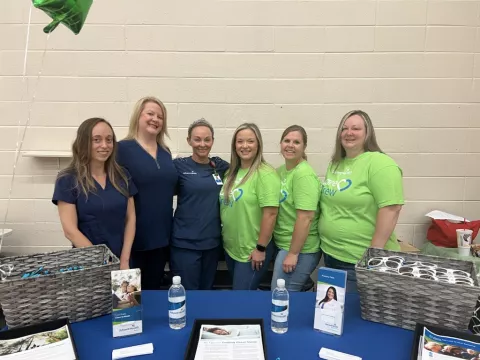- AdventHealth
Choose the health content that’s right for you, and get it delivered right in your inbox.

Sepsis, also known as "blood poisoning," is a life-threatening condition that arises as a severe response to an infection already present in the body. It can lead to organ failure, tissue damage and even death if not promptly treated. Recognizing the symptoms of sepsis and taking immediate action is crucial in saving lives.
More than 1.7 million[1] people are diagnosed with sepsis each year in the US, and sepsis remains the most common cause of hospitalization both nationwide and at AdventHealth hospitals in Georgia. Even more concerning, sepsis remains the cause of death in about a third of hospitalizations, many of which could have been prevented with earlier intervention, said AdventHealth Gordon Chief Hospitalist Daniel Treiyer, MD.
“We see sepsis almost every day in the hospital, and it's one of the most rewarding diseases we manage because if people come in in time and get the emergency treatment for it, it tends to get better,” said Dr. Treiyer. “The problem is people delay coming in and don't recognize the signs and symptoms of sepsis. Many people have heard about sepsis but may not put some of the symptoms they have together with the term ‘sepsis.’”
According to the Sepsis Alliance and sepsis.org, upwards of 87%[2] of sepsis cases occur in the community and the longer a patient waits to seek help, the higher the risk of severe damage and in some cases, death. Time really does matter.
Joseph Joyave, MD, chief medical officer of AdventHealth Gordon and AdventHealth Murray seeks to educate the community about this condition in order to save lives throughout Northwest Georgia. Recent data revealed a high number of middle aged, working men tend to have worse outcomes or complications due to sepsis at AdventHealth Gordon and AdventHealth Murray.
“Barriers such as concerns about work, cost or male bravado may be causing delays in seeking medical attention,” said Dr. Joyave. “Our medical community is dedicated to elevating sepsis to the same level of urgency as chest pain and stroke symptoms.”
Sepsis Symptoms
Sepsis can manifest through various symptoms, and it is important to be vigilant. Sepsis can begin after any type of infection, that you already have, such as in your skin, lungs, urinary tract, a wound or somewhere else. If you or someone you know experiences one or a combination of the following signs, it is essential to seek immediate medical attention at your nearest emergency department:
- Confusion or disorientation
- Shortness of breath
- High heart rate
- Fever, shivering or feeling excessively cold
- Extreme pain or discomfort
- Clammy or sweaty skin
Who is at Higher Risk?
Although anyone can develop sepsis, certain populations are more commonly affected. Understanding the higher-risk groups can help identify individuals who may be more susceptible to sepsis:
- Adults aged 65 or older
- Individuals with chronic conditions such as diabetes, lung disease, cancer and kidney disease
- People with weakened immune systems
- Children younger than one year old
The Urgency of Taking Action
Recognizing the signs of sepsis is only the first step. It is crucial to act swiftly and seek medical help if sepsis is suspected. Delaying or avoiding medical intervention can lead to severe complications. Timely treatment can make a significant difference in saving lives.
“We feel a significant effort should be made in recognition of the signs and symptoms to promote earlier presentation and recognition. These efforts should result in shorter hospital stays and more rapid return to normal life activities,” said Dr. Joyave.
Sepsis is a medical emergency that requires immediate treatment at an emergency department. If you suspect sepsis or have an infection that is not improving or getting worse, do not hesitate to act. To ensure the best outcomes, it is crucial to seek medical assistance at your nearest emergency department immediately if sepsis is suspected. Remember, sepsis is a medical emergency, and timely intervention can make a significant difference in saving lives. Together, let us prioritize early recognition and empower our community to take swift action against sepsis.
[1] Hall, MJ, et al. “Inpatient Care for Septicemia or Sepsis: A Challenge for Patients and Hospitals.” NCHS Data Brief, No 62. Hyattsville, MD: National Center for Health Statistics. 2011. https://www.cdc.gov/nchs/data/databriefs/db62.pd
[2] Rhee C, et al. “Incidence and Trends of Sepsis in US Hospitals Using Clinical vs Claims Data, 2009-2014.” JAMA. 2017;318(13):1241-1249. http://jamanetwork.com/journals/jama/fullarticle/2654187
Recent News
We had the pleasure of hosting a legislative dinner with our local delegation from Georgia to discuss the priorities that will shape 2025 and beyond for AdventHealth Georgia. It was a wonderful...
In gratitude to the men and women who have served in the United States Armed Forces, AdventHealth has partnered with Chatsworth’s Bojangles restaurant to host a special Veterans Day breakfast event...
AdventHealth invites the Murray community to kick off Thanksgiving with the Rome Turkey Trot and Feel Whole Stroll on November 28, 2024, on the AdventHealth Redmond ECO Greenway. The festivities start...
AdventHealth Medical Group is proud to announce that AdventHealth Medical Group Cardiology at Chatsworth is now open. Residents in and around Chatsworth can now easily access expert heart care close...
Throughout the month of October, the AdventHealth cancer care teams are challenging our community once again to light porches pink across Northwest Georgia to spread awareness of breast cancer.
The...
AdventHealth Georgia mobilized to send crucial medications, supplies and a respiratory therapist to our sister hospital AdventHealth Hendersonville, just a few hours after historic flooding ravaged...
When Chatsworth resident Barry Gentry turned 60 in March, he had a new outlook on life to celebrate.
Did you know one out of eight men will be diagnosed with prostate cancer in their lifetime? The American Cancer Society (ACS) informs us that prostate cancer is the most common cancer aside from skin...
AdventHealth has received Great Place To Work® Certification from Great Place To Work®, an independent third-party organization regarded as the global authority on workplace culture. The recognition...
Hospital foundations play important roles in health care organizations. Board members often serve as liaisons between their communities and the hospitals they represent. They also assist in keeping...
Some AdventHealth Murray team members participated in the Back to School Bash for Murray County on Monday. They provided school items and information regarding health services at AdventHealth Murray. ...
AdventHealth Murray and AdventHealth Gordon’s Director of Physician and Community Outreach, Tracy Farriba, spoke to the Women in Leadership (WIL) of Murray County on her professional journey and what...












